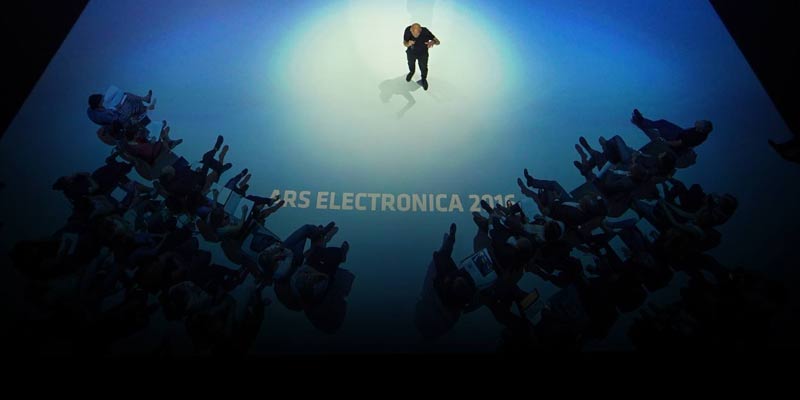The Ars Electronica Futurelab Is the Recipient of a 2017 KFV–Curatorium for Traffic Safety Research Prize
Press release: The Ars Electronica Futurelab Is the Recipient of a 2017 KFV–Curatorium for Traffic Safety Research Prize / PDF
Ars Electronica Blog: Hallo, Roboter-Auto!
(Vienna / Linz, June 23, 2017) The Robotic Road Lab created by the Ars Electronica Futurelab was honored with a KFV–Curatorium for Traffic Safety Research Prize yesterday evening. An R&D team at the Linz-based lab has been working for three years on problems having to do with the interaction of human beings and autonomous vehicles. Under the direction of technology psychologist Martina Mara and in cooperation with Mercedes-Benz, the Futurelab team designed a simulation space that is unique worldwide. It employs mobile robots and tracking & projection technology to configure a setting for tests and controlled studies. Intensive consideration of this topic is a high-priority item since high-tech producers and auto manufacturers agree that self-driving cars will be common sights in everyday life on the streets in just a few years.
The 2017 KFV Research Prize
The KFV–Curatorium for Traffic Safety’s Research Prize was launched to motivate established scientists, up-and-coming young researchers and students to come up with new concepts to improve traffic safety. Through this approach, the KFV gives promising scientific ideas a chance of being implemented in actual practice. All submissions have the possibility to make a contribution to greater safety. Scientific work and projects can be submitted in three categories. The winners are selected by a jury made up of independent experts from several countries. Each prizewinner receives a cash award of €15,000.
Internationally Unique Robotic Road Lab
Since 2013, an R&D team at Linz’s Ars Electronica Futurelab has been tackling questions having to do with communication between human beings and robotic cars, with particular consideration accorded to humans’ sense of wellbeing and feeling of security. Under the substantive direction of Martina Mara, with Christopher Lindinger and Roland Haring calling the technical shots, and in collaboration with Mercedes-Benz, the Futurelab crew set up a Robotic Road Lab that deploys mobile robots (airborne drones and ground-based vehicles) as well as projection & tracking technologies to make realistic research possible. The Robotic Road Lab is one-of-a-kind worldwide—an 8×8-meter simulation space that enables researchers, developers, designers and test subjects to play out relevant futuristic scenarios of interaction among pedestrians and diverse autonomous vehicles. In the tests, camera & sensor systems register and record the positions of the robotic and human protagonists in real time. The initial controlled study conducted in the Robotic Road Lab dealt with the effects of light signals emitted by mobile robots. The tests demonstrated that proactive signaling—via an LED display—of the intention to brake not only significantly increased the robot’s understandability; it also thereby enabled human beings to move about more efficiently and securely in simulated urban traffic situations.
“The Robotic Road Lab we created is an interdisciplinary research environment in which we can test specific interaction scenarios in a highly true-to-life setting to determine which communications signals are needed to enable human pedestrians to understand the behavior of robotic vehicles. We hope that this is a significant contribution to traffic safety in a future in which autonomous technology will play a key role but human beings will always be the center of attention,” said Martina Mara.
The Ars Electronica Futurelab
Founded in 1996, the Ars Electronica Futurelab does R&D in futuristic fields at the nexus of art, technology and society. In carrying out assignments, the laboratory-atelier works together with leading international associates in various industrial sectors, many scientific disciplines and across the artistic and cultural spectrum. The Ars Electronica Futurelab’s approximately 40 staff members bring expertise in a wide array of fields to their work—art, media & interaction design, information science, hardware & software development, psychology, physics, architecture, the social sciences, cultural studies, et al. R&D as practiced at the Ars Electronica Futurelab is essentially transdisciplinary. Artistic and scientific approaches dovetail in a way that’s particularly attuned to the needs of innovation-oriented corporations. SAP, Intel, Daimler, Hakuhodo, Toyota, BMW, Siemens, Audi and Honda regularly call upon the proficiency the Ars Electronica Futurelab makes available to its clients.
http://www.flickr.com/photos/arselectronica/35465751545/
Team Robotic Road Lab / Fotocredit: Florian Voggeneder / Printversion
http://www.flickr.com/photos/arselectronica/22440815383/
Scientific Studies / Fotocredit: Martin Hieslmair / Printversion
http://www.flickr.com/photos/arselectronica/23073183451/
Scientific Studies / Fotocredit: Martin Hieslmair
http://www.flickr.com/photos/arselectronica/35313432792/
KFV-Forschungspreis 2017 / Fotocredit: KFV (Kuratorium für Verkehrssicherheit)/APA-Fotoservice/Katharina Roßboth / Printversion

